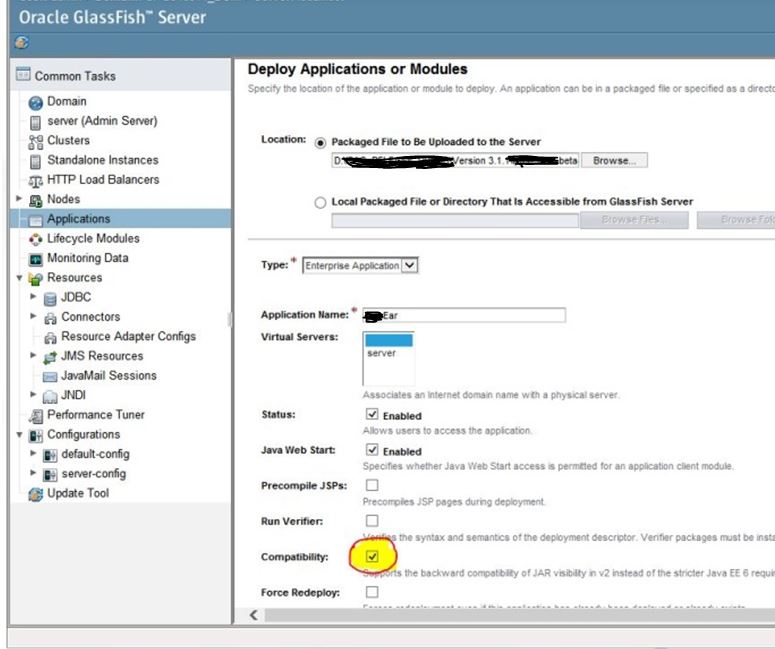This is my first foray into using JMS. I have a successfully created/deployed a war file that contains a servlet that I can use to upload files. When a file is uploaded it sends a message to a JMS queue. Next I wrote a listener to retrieve the uploaded messages from the queue, but when I try to deploy it, I get this error:
SEVERE: Invalid ejb jar [file-listener-ejb-1.0.jar]: it contains zero ejb.
Note:
1. A valid ejb jar requires at least one session, entity (1.x/2.x style), or message- driven bean.
2. EJB3+ entity beans (@Entity) are POJOs and please package them as library jar.
3. If the jar file contains valid EJBs which are annotated with EJB component level annotations (@Stateless, @Stateful, @MessageDriven, @Singleton), please check server.log to see whether the annotations were processed properly.
at com.sun.enterprise.deployment.util.EjbBundleValidator.accept(EjbBundleValidator.java:76)
...<snip>...
It's a very simple project with one class, built using Maven. The class looks like this:
package my.package;
import javax.ejb.ActivationConfigProperty;
import javax.ejb.MessageDriven;
import javax.jms.JMSException;
import javax.jms.Message;
import javax.jms.MessageListener;
import javax.jms.ObjectMessage;
import org.slf4j.Logger;
import org.slf4j.LoggerFactory;
@MessageDriven(mappedName = "jms/FileUploadedQueue", activationConfig = {
@ActivationConfigProperty(propertyName = "acknowledgeMode", propertyValue = "Auto-acknowledge"),
@ActivationConfigProperty(propertyName = "destinationType", propertyValue = "javax.jms.Queue") })
public class FileListener implements MessageListener
{
private static Logger log = LoggerFactory.getLogger(FileListener.class);
public FileListener()
{
// empty constructor
}
public void onMessage(Message message)
{
try
{
log.info("Received message: " + ((TextMessage)message).getText());
}
catch (JMSException ex)
{
String error = "Received error code '"
+ ex.getErrorCode()
+ "' retrieving message from queue jms/FileUploadedQueue.";
Exception linkedEx = ex.getLinkedException();
if (linkedEx != null)
{
log.error(error += "Linked exception: ", linkedEx);
}
else
{
log.error(error, linkedEx);
}
}
}
}
My pom.xml looks like this:
<project xmlns="http://maven.apache.org/POM/4.0.0" xmlns:xsi="http://www.w3.org/2001/XMLSchema-instance"
xsi:schemaLocation="http://maven.apache.org/POM/4.0.0 http://maven.apache.org/xsd/maven-4.0.0.xsd">
<modelVersion>4.0.0</modelVersion>
<groupId>my.package</groupId>
<artifactId>uploaded-file-listener</artifactId>
<version>1.0</version>
<packaging>ejb</packaging>
<dependencies>
<dependency>
<groupId>org.slf4j</groupId>
<artifactId>slf4j-log4j12</artifactId>
<version>1.4.2</version>
</dependency>
<dependency>
<groupId>log4j</groupId>
<artifactId>log4j</artifactId>
<version>1.2.14</version>
</dependency>
<dependency>
<groupId>javax.jms</groupId>
<artifactId>jms</artifactId>
<version>1.1</version>
<scope>provided</scope>
</dependency>
<dependency>
<groupId>javax</groupId>
<artifactId>javaee-api</artifactId>
<version>6.0</version>
<scope>provided</scope>
</dependency>
</dependencies>
<build>
<plugins>
<plugin>
<artifactId>maven-compiler-plugin</artifactId>
<version>2.3.2</version>
<configuration>
<source>1.6</source>
<target>1.6</target>
<compilerArguments>
<bootclasspath>${settings.localRepository}/javax/javaee-endorsed-api/6.0/javaee-endorsed-api-6.0.jar${path.separator}${sun.boot.class.path}</bootclasspath>
</compilerArguments>
</configuration>
</plugin>
<plugin>
<groupId>org.apache.maven.plugins</groupId>
<artifactId>maven-ejb-plugin</artifactId>
<version>2.3</version>
<configuration>
<ejbVersion>3.1</ejbVersion>
</configuration>
</plugin>
</plugins>
</build>
</project>
This builds a jar file which when I try to deploy to my Glassfish 3.1 server (via the admin console) results in the above error.
Since I have the @MessageDriven annotation on my class, I'm not sure what I'm doing wrong. Unfortunately, the server.log file does not contain any more details about the error.
Should I be packaging the jar in an ear and deploying that?
----------EDIT----------
I created an ear which includes the ejb jar, and I get the same error when I deploy the ear to Glassfish. So, I think it must be something to do with the annotation. However, I've looked at multiple examples/tutorials and I can't see what's wrong.
Any insights/suggestions would be most welcome!!
----------EDIT TWO----------
Contents of MANIFEST.MF files:
Manifest-Version: 1.0
Archiver-Version: Plexus Archiver
Created-By: Apache Maven
Built-By: <name>
Build-Jdk: 1.6.0_24
Contents of application.xml:
<?xml version="1.0" encoding="UTF-8"?>
<!DOCTYPE application PUBLIC
"-//Sun Microsystems, Inc.//DTD J2EE Application 1.3//EN"
"http://java.sun.com/dtd/application_1_3.dtd">
<application>
<display-name>FileListener-ear</display-name>
<module>
<ejb>file-listener-ejb-1.0.jar</ejb>
</module>
</application>
----------EDIT THREE----------
Contents of ejb-jar file:
<?xml version="1.0" encoding="UTF-8"?>
<ejb-jar xmlns="http://java.sun.com/xml/ns/javaee" xmlns:xsi="http://www.w3.org/2001/XMLSchema-instance"
xsi:schemaLocation="http://java.sun.com/xml/ns/javaee http://java.sun.com/xml/ns/javaee/ejb-jar_3_1.xsd"
version="3.1">
<display-name>FileListener</display-name>
<enterprise-beans>
<message-driven>
<ejb-name>FileListener</ejb-name>
<ejb-class>my.package.FileListener</ejb-class>
<transaction-type>Container</transaction-type>
</message-driven>
</enterprise-beans>
</ejb-jar>

